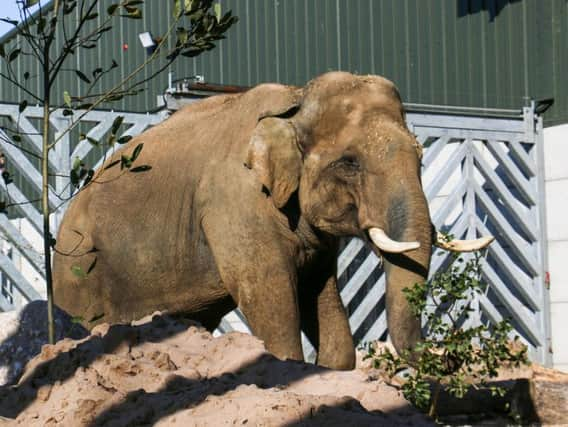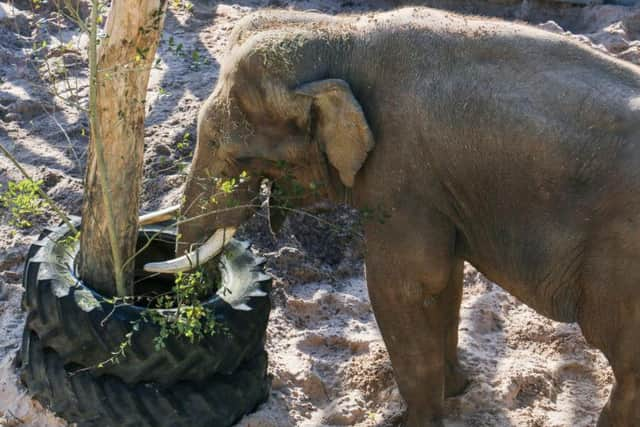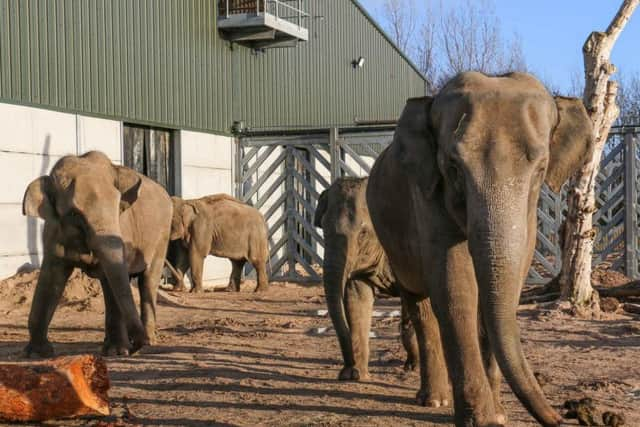First male elephant in Blackpool Zoo's history welcomed


Emmett made the careful journey to the resort from Whipsnade Zoo in Bedfordshire to join the all-female herd and, it is hoped, start a family.
It follows several years of planning – and millions of pounds being spent on making Blackpool home to one of just four breeding herds of Asian elephants in the UK.
Advertisement
Hide AdAdvertisement
Hide AdHead of Project Elephant, Adam Kenyon, said Emmett, 28, is “crucial from a biological point of view” and said his past experience of siring young “means he is perfectly placed to teach the next generation of elephants”.


Darren Webster, director at the East Park Drive attraction, added: “Emmett is a fundamental part of our plan to secure a future for this magnificent species. Ground broke on Project Elephant in 2016 and his arrival marks the start of a thrilling journey.”
For years, 50-year-old Kate – the first animal to arrive at the zoo in 1972 – was the sole Asian elephant, living in an old aerodrome hangar.
But the Spanish-owned attraction invested around £5 million in new state-of-the-art living quarters that opened to the public in March last year, slightly behind schedule.
Advertisement
Hide AdAdvertisement
Hide AdGradually, the rest of the herd was moved from Twycross in Leicestershire and is now five-strong: Kate, and her new companions Tara, Minbu, Noorjahan, and Esha, who is the youngest at five.


Bosses have been working with keepers at the Twycross and Whipsnade zoos, as well as experts from the European Endangered Species Programme (EEP) on the project, and Mr Webster said Blackpool’s “outstanding facilities provide a great environment” for the herd to thrive.
Malcolm Fitzpatrick, senior curator of mammals at Whipsnade, added: “Emmett’s move is an exciting one for his new herd at Blackpool as well as the herd at Whipsnade Zoo, who will themselves soon be welcoming a new male into the group.
“Male elephants in the wild do not stay with one matriarchal herd for their lifetimes, so this replicates a natural process for both males – we’re sure Emmett will waste no time getting to know his new herd.”
Advertisement
Hide AdAdvertisement
Hide AdThere are feared to be just 40,000 Asian elephants in the wild, down from more than 100,000 at the turn of the 20th century.
With the population continuing to plummet, the species has been on the endangered list since 1986. Numbers have dropped by 50 per cent over the past three 60 to 75 years.
The conservation charity WWF cited habitat loss, conflict with humans, poaching, and capture as particular threats.
“Elephant poaching is not as severe a threat as it is in Africa, but Asian elephants are still killed for their tusks, meat, and skin,” it said.
Advertisement
Hide AdAdvertisement
Hide Ad“They’re also taken from the wild for the live elephant trade, primarily going to Thailand for the tourism industry.
“India, Vietnam, and Myanmar have banned capture in order to conserve their wild herds, but in Myanmar elephants are still caught each year for the timber industry or the illegal wildlife trade.
“Unfortunately, crude capture methods have led to a high mortality level. Efforts are being made not only to improve methods but also to encourage captive breeding rather than taking from the wild.”
Blackpool Zoo, which is owned for Parques Reunidos, has an ongoing commitment to the species, and is a long-term supporter of the Biodiversity and Elephant Conservation Trust (BECT) in Sri Lanka.
Formed in 1998 the non-profit organisation identifies and addresses the social issues of human and elephant conflict in order to facilitate the conservation of the species.